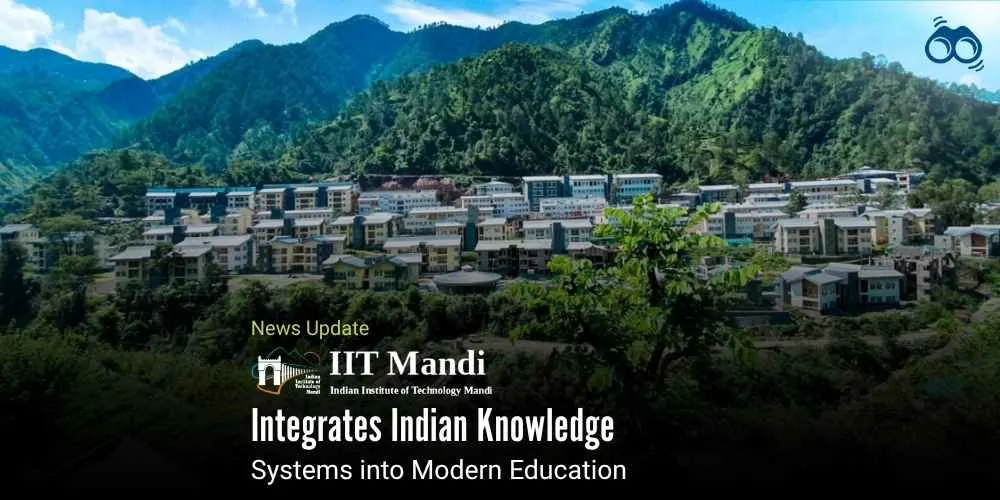From ancient manuscripts to AI labs, IKS gets a scientific makeover at IIT Mandi
NEP 2020 Sparks Nationwide Push for Indian Knowledge Systems in Curriculum
Indian Knowledge Systems (IKS) represent a vast and diverse intellectual tradition developed over millennia, rooted in holistic thinking, experiential learning, and indigenous approaches to science, health, philosophy, ecology, and education. These systems offer sustainable and culturally grounded responses to contemporary global challenges. Following the introduction of the National Education Policy (NEP) 2020, IKS has gained renewed attention in education and research. The policy mandates that at least 5% of credits in undergraduate and postgraduate programmes be allocated to IKS-related courses. These courses are now being offered in disciplines such as governance, linguistics, medicine, and environmental conservation. NEP 2020 has also encouraged institutions to incorporate subjects like Ayurveda, Yoga, Vedic mathematics, astronomy, architecture, agriculture, and philosophy, many of which are based on principles of sustainability and holistic living.
At the forefront of this movement is IIT Mandi, which is actively integrating IKS into structured academic formats. The institute has launched a Master of Arts programme in IKS that blends classical texts with contemporary research methods. According to Director Professor Laxmidhar Behera, the aim is not just to study the past, but to test, adapt, and apply its principles to modern needs. IKS elements are currently being used at IIT Mandi in fields such as engineering, environmental science, mental health research, and data analysis. Research includes investigating traditional water harvesting systems and ancient metallurgy techniques for sustainable applications. IKS concepts like panchabhuta, prakriti, vastu, and dharmic design are also being explored using advanced technologies, including artificial intelligence, materials science, and bioengineering.
The IKSMHA Centre at IIT Mandi (Indian Knowledge Systems and Mental Health Applications) is a key initiative in this regard. For instance, one study focuses on treating aplastic anaemia using amla rasa, neem rasa, and giloy, and researchers are now testing the treatment on mice to analyse its effects on bone marrow at the cellular level. Such studies aim to position IKS not just as cultural heritage, but as a credible, scientific body of knowledge.
In the area of health and wellness, researchers are combining traditional meditation practices with modern tools such as EEG machines to study brain activity. Students are also being sent to remote villages in Himachal Pradesh to document oral histories, helping preserve and digitise local knowledge. These efforts are integrated into academic modules, sustainability projects, and even entrepreneurship.
To that end, IIT Mandi has also launched EWOK (Enabling Women of Kamand)—a platform supporting local women entrepreneurs. It helps recognise, certify, and scale traditional knowledge for economic empowerment, bridging heritage and innovation. Professor Behera emphasised that IKS encourages practices like circular economy, low waste, biodiversity conservation, and climate-resilient techniques—many of which align naturally with current sustainability goals. He argued that traditional Indian systems provide ecological wisdom and values-driven frameworks that can guide modern technological development in ways that support both human well-being and the environment.
The institute is also playing a leading role in taking IKS to global platforms. IIT Mandi has hosted two editions of the Mind, Brain and Consciousness Conference (in 2023 and 2025), with research papers now being published in four volumes by Springer. Professor Behera himself was invited to give a plenary talk at the 31st Annual Science of Consciousness Conference in Barcelona in July 2025—an indication of growing international recognition of IKS.
To further expand the global reach of Indian Knowledge Systems, IIT Mandi has submitted a proposal to the Ministry of Education suggesting the following:
- Hosting IKS-focused sessions at major global events such as the COP climate summits, UNESCO heritage talks, and the World Economic Forum.
- Collaborating internationally on research in Ayurveda, Yoga, sustainable agriculture, and Vedic sciences.
- Offering IKS-based courses on global platforms like edX, Coursera, and Erasmus+.
- Promoting Ayurveda, Yoga, and Vaastu as global wellness tools.
- Pursuing global recognition for IKS under the WHO Traditional Medicine Strategy and UNESCO’s Intangible Heritage List.
- Supporting the export of IKS-based products, such as Ayurvedic medicines, handicrafts, and organic farming techniques, through certifications like the AYUSH mark and GI tags.
Through this multifaceted approach, IIT Mandi aims to position IKS as a forward-looking, scientifically validated, and globally relevant system, blending ancient wisdom with modern innovation.
Editor’s Note:
The resurgence of Indian Knowledge Systems (IKS) marks a significant intellectual and cultural shift in the nation’s educational landscape. As highlighted in the comprehensive coverage of IIT Mandi’s initiatives, IKS is no longer confined to historical reverence, it is steadily becoming a forward-looking academic and research domain, offering practical solutions to modern challenges. India is integrating ancient wisdom like Ayurveda, Yoga, and Vedic mathematics into modern education, transforming it from rote learning to values-based inquiry and reclaiming its scholarly heritage.NEP 2020 promotes the inclusion of IKS in higher education. IIT Mandi exemplifies this by integrating ancient practices with modern science through rigorous, interdisciplinary, and innovative approaches, demonstrating how uniquely Indian pathways can contribute to global discourse. The development highlights a growing convergence between traditional knowledge (IKS) and modern science. IKS promotes ecological awareness, holistic health, and culturally rooted research, crucial as global educational models face scrutiny. While IKS revival is positive, it must avoid cultural romanticism and embrace scientific scrutiny. IIT Mandi's data-driven, globally engaged approach is a good model.
Skoobuzz stated that including Indian Knowledge Systems (IKS) in education could greatly improve how students in India learn. It can help create a generation that is not only smart and creative but also proud of their culture.














0 Comments (Please Login To Continue)